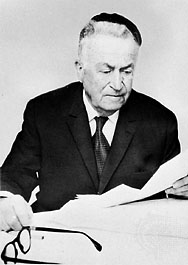
Shmuel Yosef Agnon
 Shmuel Yosef Agnon |
 Ed Morgan |
| 10 October 2005 |
Your "New Year's Greeting for a Just Society" on the Canadian Jewish Congress web site relates Shmuel Yosef Agnon's Kilikov Trial parable:
One of S.Y. Agnon�s most insightful tales, The Kilikov Trial, is also one of his shortest. In fact, it is so concise that I will reproduce it here in full before drawing on its lessons: I have still not concluded all my praise for Kilikov, for not for its worldly qualities alone is Kilikov to be extolled, but it is to be praised for the judicial decisions of its judges. What are the decisions of its judges? It is told that once, during the Polish wars, a gentile killed his friend in Kilikov. Maliciously or accidentally? From the judgment it emerges that he was killed with malice. He was put in jail and convicted of killing, as a man is convicted when murdering another with malice.
[...] Although it has the feel of a period piece about pre-war Europe, it contains a timeless lesson for all of us in the business of advocating for a better society. Ed Morgan, New Year�s Greeting for a Just Society, Canadian Jewish Congress, 06-Oct-2005 www.cjc.ca/template.php?action=news&story;=751# |
The premier of Ontario has recently announced his government�s intention to withdraw legal recognition from all religiously arbitrated family law disputes. The announcement comes on the heals of a campaign by the Muslim community to bring Sharia-based family law tribunals to Ontario, and a counter-campaign by Muslim women to ban the use of Islamic law in such a gender-sensitive context. The Beit Din, which has for many years provided family adjudications for the Orthodox sector of our community, has been sacrificed for the sake of gender equality across all sectors of society. Ed Morgan, New Year�s Greeting for a Just Society, Canadian Jewish Congress, 06-Oct-2005 www.cjc.ca/template.php?action=news&story;=751# "Heals" instead of "heels" is in the original. |
Cotler said that the hoax issue links up with that of individual prosecution. The reasoning goes like this: If there was no Holocaust � there were no crimes. If there were no crimes � there are no criminals and no one can be prosecuted. |
To combat a Holocaust-denial movement, Cotler urges prosecution of former Nazis to prove its lies. "If we don't bring criminals to justice,
Zundel and others will say it's proof there were no crimes committed."
|